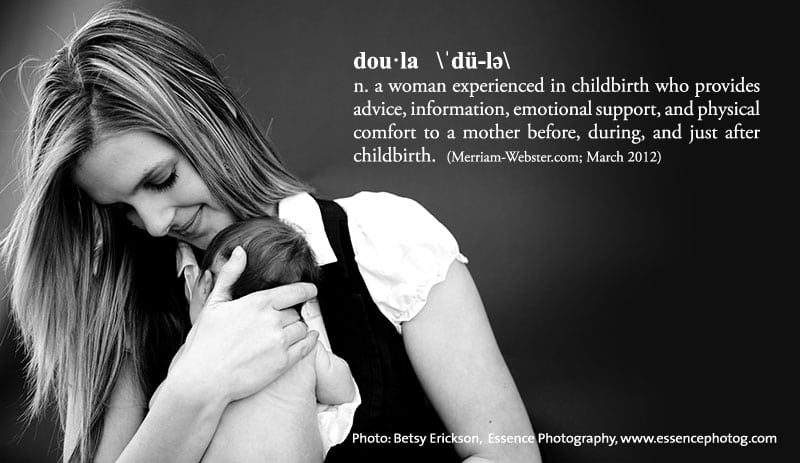 Image by BirthRoots
Image by BirthRoots
A Doula, different than a midwife, is a trained professional who offers emotional, physical, and informational support during pregnancy and labor.
Without the Doula…
A mother may go in with a strong desire to follow her natural birth plan during her pregnancy, and have as little unnecessary intervention as possible. Yet without a trained birth attendant at her side {without a doula}, these situations most often don’t end up favorable for Mama.
As an in-hospital doula, I see and hear all of these scenarios in their various forms time and time again. Doulas are prepared and qualified to handle many situations a mother may not expect to come across.
With the Doula…
Doulas play a very unique and special role in a birth. While the midwife or physician’s job is to be there for when you birth your baby, the doula’s job is to focus on you (throughout the entire labor and delivery). The doula title translates to “servant of the mother.” How beautiful is that?
The word “doula” refers to a “woman experienced in childbirth who provides continuous physical, emotional and informational support to the mother before, during and after childbirth.” (Klaus, Kennell and Klaus, Mothering the Mother)The key word here is SUPPORT. Continuous physical, emotional and informational support.
Let’s go back and add in the roles of a doula specifically to these three scenarios:
 Image by LeaWolf
Image by LeaWolf
Scenario 1: Alone at night
The doula stays up throughout the night never leaving pregnant Mama’s side, waiting on her hand and foot. A bath may be drawn for her to relieve some discomfort. She may massage in areas that are aching, making sure that Mama feels like someone understands what she’s going through and that if she should need anything, someone is awake and alert and ready. The doula provides practical physical services that although simple can change the course of labor dramatically. These include everything from suggesting position changes, giving mama sips of water, and giving her hot or cold rags.
Doulas often use the power of touch and massage to reduce stress and anxiety during labor. Massage has been proven to help stimulate the production of natural oxytocin. The pituitary gland releases natural oxytocin into the bloodstream, causing uterine contractions, and into the brain, resulting in feelings of well being, drowsiness and higher pain threshold. Because the synthetic IV oxytocin called Pitocin cannot cross into both the bloodstream and the brain it increases the contractions without the positive psychological benefits of natural oxytocin.
 Image by Inhabitots.com
Image by Inhabitots.com
Scenario 2: Giving Up
Emotional
The doula recognizes this almost verbatim phrase from the mother during pregnancy, which is often heard at the transition phase; “I just can’t do it anymore.” The hospital staff knows that nothing is actually wrong, so the doula emphasizes that this is her last and final stage. While everyone else is feeding an “out of control” energy and not knowing what to do or how to help, the doula can guide Mama’s partner on what exactly to do in that moment. Her words of comfort and verbal cues to the Mama in that moment is exactly what Mama needs to hear to get her through that moment. Simply informing her, “You’re almost done!” restores power to her body and strength to her bones.
Emotional measures include being a source of encouragement and reassurance throughout all of labor and serves as a continuous physical presence.
 Image by One Happy Doula
Image by One Happy Doula
Scenario 3: Water Breaks
Informational
The doula responds with all possible suggestions to get labor going naturally. Practical advice is offered and suggestions of walking around and nipple stimulation. red raspberry leaf iced tea may be offered to set the mood of the room with music and candles for ultimate relaxation.
The doula explains how infection sets in and what all of her options are at this point. She does not make a decision for the parents, but she allows them to make their own decision based on informed consent. They inform the parents on how exactly Pitocin works and the benefits and risks of using it.
Most doula-client relationships begin a few months before the baby is due. During this time they develop a relationship where the mother feels free to ask questions, discuss her fears and create a birth plan. Since care providers may not be able to be with you every moment (perhaps at home before going to the birth center or in the rare case of transport), the doula helps parents process the information they need to make informed decisions.
While doulas do not provide any type of medical care, they are knowledgeable in many medical aspects of labor and delivery. With this knowledge they can help their clients gain a better understanding of the procedures and possible complications of pregnancy or delivery.
A doula does not replace a doctor or midwife or your partner, but they do possess special skills that make them a valuable addition to your birth team. She will accompany couples through the entire birth journey using her experience and knowledge to help them have a satisfying birth.
It is safe to say that the valuable role of a doula is highly underestimated. The service of a doula does, in fact, make a difference. I’m told this after every birth.
The real question is … why shouldn’t you hire a doula?



0 thoughts on “What is a Doula and Why Should I Hire One?”